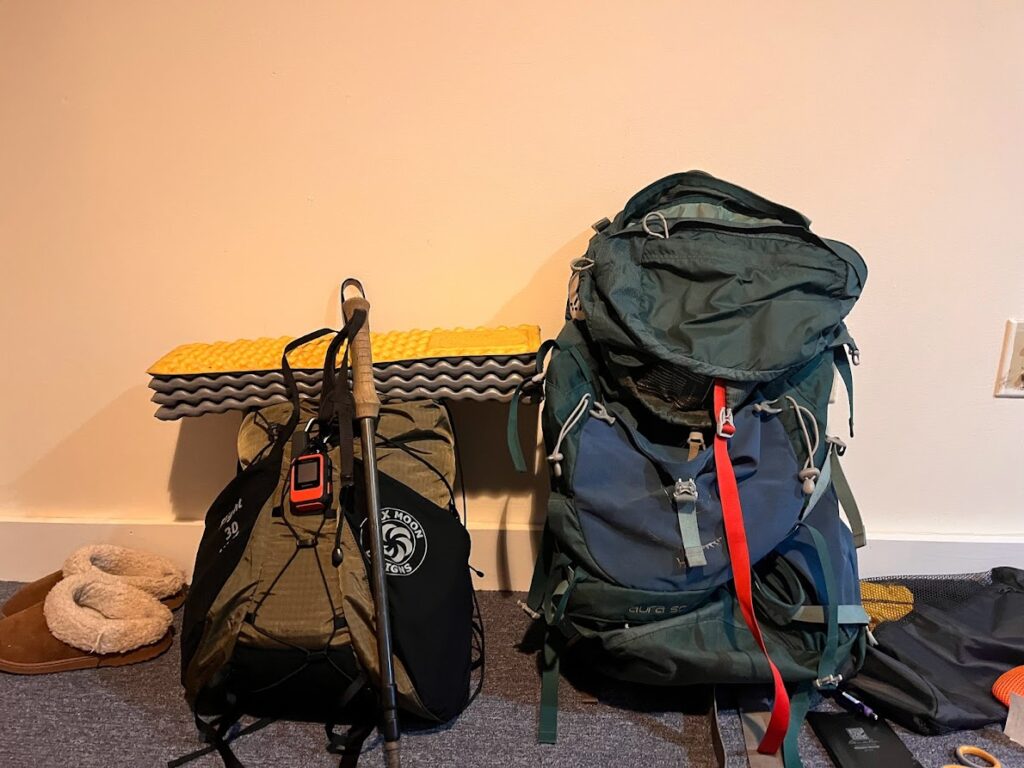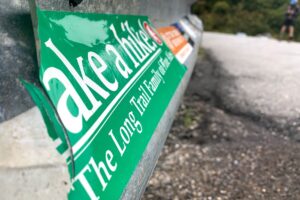
“How fast do you think Spitfire would be if she didn’t have such a heavy pack?” This is a valid question posed by two companions from my thru-hike of the Appalachian Trail in 2017. At the time, my pack weighed about 45 pounds with food and water. I couldn’t care less about my base weight. My extra gear didn’t bother me – it made me stronger.
It’s not that I didn’t try to slim down my pack. There were two occasions when I sent home several pounds of extra junk I didn’t need. Each time I filled the extra space with extra food, something I needed, but not to that extent. I’d heard of people getting caught two days out from a resupply with only a hot cocoa packet and a granola bar to sustain them. I would not be that person. Instead, I would come into town with plenty of extra food. There’s a thru-hiker mantra; “You pack your fears.” Me, I was afraid of being hungry.

It’s been six years since the AT. Despite my enormous backpack, I finished it in 5 months and 4 days. Since then, I’ve completed several other thru-hikes, and my pack keeps getting smaller. For the next adventure, I would need to seriously challenge my perception of what I needed in my backpack. A thru-hike is one thing. You can afford a little extra weight because there’s no real NEED to be fast. An FKT, on the other hand, is ONLY about moving fast. Here’s a breakdown of what I’ll be using for the Long Trail:
- Pack: Six Moon Designs Flight 30 Ultra
- Sleeping Bag: Sea to Summit Spark 40
- Shelter: Uno Mas Tarp and Burrito Bivy by Anda
- Warm things: A puffy (Mountain Hardware Ghost Whisperer), a light hat, and a light pair of mittens (Montbell UL Shell Mittens)
- Rain gear: Jacket (OR Helium 2) and pants (Marmot Precip Eco)
- Extra socks (2 pair)
- Basic first aid (to include pre-cut leukotape strips, ibuprofen, a needle, and some lube to prevent chaffing)
- Electronics: Headlamp (NiteCore NU33), Battery bank (Anker, 20kmAh), GPS (Garmin InReach Mini 2)
- Cooking: Stove (BRS), cup (Toaks Titanium 1100mL), Spoon (Sea to Summit Alpha Light), fuel, water filter (Sawyer Squeeze)
To see the complete list, click here. Every item was carefully considered, and all are crucial. My base weight is around 8 pounds, which is astounding considering the monstrosity I carried on the AT. The most apparent critique anyone with any experience will have about my setup is that I’m not going stoveless. I thought long and hard about it, and in the end, the stove will enable me to eat better, more nutritious foods while on the trail. I’m doing my best to eat more than backpacking junk this time. Folks will argue that time spent cooking is time not spent sleeping, eating, or hiking. Even though I’ll have to stop hiking to cook, I can easily pack up and hike while I eat. Plus, I rarely can sit down and immediately be able to fall asleep. The time between hiking and sleeping can be used for cooking and eating.

Now that we’ve got the gear part of this post out of the way, I’d like to take some time to talk about the other extra fluff that I decided not to bring with me. Everyone already knows that almost two years ago, I had surgery to fix my hip, couldn’t run for a full two years, was depressed, blah blah blah. You don’t know that during those two years of limited activity, I picked up some bad habits and a fair bit of extra body weight. You’d think that all that extra weight would come off once I resumed running, but it didn’t.
I know what you’ll say because I’ve heard it a million times. ” Oh my gosh Erica, you are NOT fat. You’re just fine the way you are. You don’t need to lose weight!” Bullshit. Cut the crap. Stop coddling me. I’m sick of it. I’m sick of being told that I’m healthy enough. I don’t want to be healthy enough, fit enough, slim enough. I want to be the BEST version of myself. People constantly tell me I don’t need to do more because they don’t expect more from themselves. I am not comparing myself to the average person anymore; I’m comparing myself to the athlete constantly asking, “What are my limits? How far can I really go?” I’m asking myself these questions because I expect more from myself, which makes me a minority.

So I started the process of changing my relationship with food. There was little wrong with WHAT I ate, but the HOW MUCH was another story. Breakfast would be two bowls of cereal and a muffin, and to polish it off, I’d dive into a bag of pretzels dipped in Nutella because I was bored. Remember how I said I was afraid of being hungry? I decided it was time to embrace it. I started to limit my intake, and I saw results immediately. Yeah, I had to deal with being hungry sometimes, but it became something that I’d look forward to. I tell myself to suck it up and start burning some fat. Now, two months later, I’ve lost 10 pounds. It’s the first time since finishing the AT that I’ve been below 120 lbs, and I feel phenomenal.
All in all, I’m proud of myself. Not only did I cut my base weight down to something that most would consider “uncomfortably light,” and I’ve also managed to cut my own weight down. A fellow hiker once said, “Ounces are pounds, and pounds are pain.” Some folks think putting on extra fat before a big hike is helpful so you have some reserves to burn. In this case, I disagree. The extra pressure that weight puts on your body isn’t worth it. In 25 days, I will stand at the Canadian border, as streamlined and lightweight as possible.


Spitfire, I’m so excited for your FKT attempt! Also, thanks as always for your courageous sharing of how you’re doing mentally and physically. I find your comments about your health goals match with my own health goals. I plan to live until I’m 100 and I want to be healthy along the way. I’ve always felt strong and wanted to test my physical limits as an athlete. When I gained weight after the AT it was a depression weight, not a “my body is healthier at this weight.” I’ve had quite a few people tell me I’m not fat and/or that maybe my body is healthier here. It’s not – I continue to put a lot of strain on my digestive system with the volume of food I’m eating. The amount of sugar I consume is especially problematic. Plenty of studies can tell us about the problems of overeating and how calorie restriction likely produces longer lives. Other studies have linked high sugar intake to high inflammation and a host of diseases. I’m pretty sure some of these food/illness links are causal, not just correlated. For example, this study
Our culture, in the process of trying to stop shaming people for their size (yay! good thing!), has led to discomfort around discussing weight. It has also led to a little bit of that reversal you’re talking about where people tell you you’re not fat even when you are. I’m glad the pendulum has swung in the direction of being kind and forgiving about these discussions. However, I think when the pendulum swings back I’d love it to stop in the middle – rather than judging people’s weight we’ll just ask about a person’s goals. Erica, your goal is your athleticism and I love that. I can’t wait to see what you accomplish!